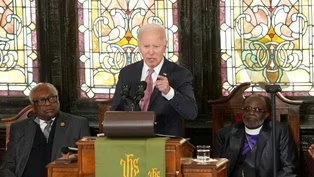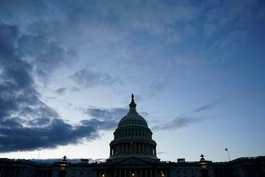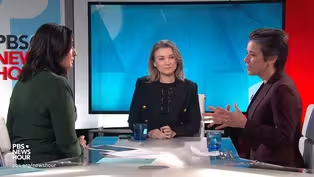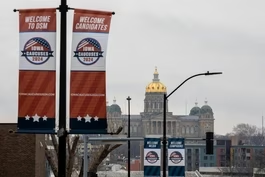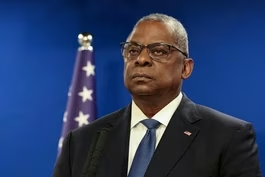
How money is changing the landscape of college sports
Clip: 1/8/2024 | 7m 1sVideo has Closed Captions
How money is changing the landscape of college sports
College football will have a new national champion Monday night after Michigan takes on Washington in Houston. Both are undefeated and aiming to win their first national title since the '90s. But this championship game is the end of an era for college football with major changes coming next year. Stephanie Sy reports.
Problems playing video? | Closed Captioning Feedback
Problems playing video? | Closed Captioning Feedback
Major corporate funding for the PBS News Hour is provided by BDO, BNSF, Consumer Cellular, American Cruise Lines, and Raymond James. Funding for the PBS NewsHour Weekend is provided by...

How money is changing the landscape of college sports
Clip: 1/8/2024 | 7m 1sVideo has Closed Captions
College football will have a new national champion Monday night after Michigan takes on Washington in Houston. Both are undefeated and aiming to win their first national title since the '90s. But this championship game is the end of an era for college football with major changes coming next year. Stephanie Sy reports.
Problems playing video? | Closed Captioning Feedback
How to Watch PBS News Hour
PBS News Hour is available to stream on pbs.org and the free PBS App, available on iPhone, Apple TV, Android TV, Android smartphones, Amazon Fire TV, Amazon Fire Tablet, Roku, Samsung Smart TV, and Vizio.
Providing Support for PBS.org
Learn Moreabout PBS online sponsorshipMichigan takes on Washington in Houston.
Both## are undefeated and aiming to win their# first national title since But, as Stephanie Sy explains, this championship# game is the end of an era for college football## with major changes coming next year.
STEPHANIE SY: Starting next year, the college## football playoffs will expand substantially,# allowing a dozen teams to compete for the title.
And that's just one of the# dramatic changes affecting## what has become an American pastime.# Just before the bowl NCAA President Charlie Baker unveiled a# new proposal that would impact all college## sports.
It would allow Division I schools# to pay athletes directly for the first time.
Colleges that participated would have# to set aside a minimum of $30,000 per## athlete for at least half of all# its athletes.
Schools also could## have direct agreements with athletes# over their name, image, and likeness.
Pat Forde is covering all of# this.
He's a senior writer for## "Sports Illustrated" and joins me from Houston.
Pat, I'm reminded about something# Deion Sanders said recently about## the conference realignments# in college football.
He said,## all this is about money.
It's about a# bag.
And everyone's ch How does this new proposal by Charlie# Baker affect the chase for the money bag?
PAT FORDE, "Sports Illustrated": Well, I# think it's an acknowledgement, Stephanie,## that the bag is the game,# that that is what's going And that if the NCAA is going to stay# ahead of the lawsuits that are hounding## them and trying to basically force# an employee-employer relationship,## if they want to maintain any kind# of antitrust exemption, if they## want to get Congress to help maintain college# sports as even remotely what I think they see this as a necessary step, that# they have to give some of the proceeds directly to## the athletes and can't cloak it in other means or# fashions, but just literally hand them the money.
STEPHANIE SY: And for all the# reasons you just described,## this is just a beginning.
It's very complex.
If schools, though, were allowed eventually to# directly pay athletes, would to the athletes who play large revenue-generating# sports like football, or does it actually increase## opportunities for good athletes that# might not get the big endorsement money?
PAT FORDE: Well, that still# remains to be seen to a degree,## but there are certainly concerns# about wher And we will start to learn more at the# NCAA convention here in the wh ere we're going to get maybe a# little bit more detail on proposals## or counterproposals that have been made# in this area.
But we're ta minimum of $30,000 for half of the school's# athletes.
Who is that half?
Who gets that?
We can rest assured the football players are# going to get theirs.
The men's basketball players## are almost assuredly going to get theirs.
There# will be a Title IX component to this, where women# athletes also would get theirs, some of them.# But then who doesn't?
Where is that line drawn?
And I think, if you're in an Olympic sport,# and probably in a men's Olympic sport,## you probably are thinking that you're# going to have a hard time getting a hold## of that money.
And the other thing# there, the other pie we're talking about a minimum of# $30,000 for half of your athletes.
A lot of them are going to pay a lot more than# that.
So we're talking $6 million, $8 million,## $12 million maybe per year which maybe schools# would have to budget for.
And that's going to## weed some of the schools out of competition# for the biggest prizes in the sports too.
STEPHANIE SY: Nick Saban, Alabama's head# coach, has described college football as## heading in a semipro direction already.
Saban's# had a lot to say about all of this, of course.
But does Charlie Baker's proposal# show that college sports are bound## to become a completely free market enterprise?
PAT FORDE: Well, I mean, it's another step# that direction.
And then the qu the NCAA, as they often do with rules# here, they're hoping to thread a need which keeps it from being# flat-out professional sports,## that keeps it from athletes being employees,# that keeps the NCAA's antitrust status.
I don't know whether they're going# to be able to pull this off.
I mean,## there are lawsuits right now pending that cou NCAA schools.
And so they're kind of backed# into a corner here, and they're trying to## figure out a way to keep college sports as# part of campus and part of higher education.
But it gets harder and harder with each# kind of erosion of the NCAA's stance## in a lot of these things.
So this is the# next step, and it's a strategic retreat,## I guess you would say, towards# something that may be sustainable.
But, again, they're going to need help# from Congress.
They're going to need to## win some battles probably in court or# to get people to dro STEPHANIE SY: Does the proposal have legs?
PAT FORDE: Yes, it does, absolutely.
Now, what we're going that we're going to hear counterproposals# and people that will probabl some holes in this thing, and at least to# say, let's find a little bit better way.
Charlie Baker's proposal, while certainly# bold and a big step forward and something## that I think needed to happen, it's very# light on details.
And the devil has always## been in the details of trying to# work out something for hundreds,## if not thousands of colleges# at multiple different levels.
And one key part of this proposal is potentially# a super division of schools 60 , 80 schools, and they can be further# deregulated in what they can give to athletes,## in terms of what they can afford.
Now,# the problem there is that it further## widens the gulf in something that people, I# think, like to see all comers, so to speak,## a 120-school division of college -- major college# football, a 350-school division of major college## basketball that makes the NCAA Tournament so# much fun when the underdogs win those games.
Do we eventually move the big dogs so# far away that there is no relation with## those other schools?
That's kind of where# they're trying to find the line there.
STEPHANIE SY: And speaking of college# football, I can't let a senior "Sport Illustrated" writer go without getting his take# on the championship game c Pat, what will you be looking out for in# this matchup between Washington and Michigan?
PAT FORDE: Yes, should be a great matchup.
Really# looking forward to it, the passin Washington with Michael Penix quarterback and the# receivers, a lot of first round NFL talent there,## against really the brute force and blunt force# of Michigan in the way of their style of play.
And Michigan's been under the microscope# with some controversies about NCAA rules## this year.
They have handled it.
They have# answered all questions.
We have got two 14-0## teams playing each other.
We're going to have# a very worthy champion one way or the other.
STEPHANIE SY: Pat Forde with "Sports Illustrated."
Thanks so much for joining us, Pat.
PAT FORDE: Thank you, Stephanie.
Biden says hate that motivated church shooter still a threat
Video has Closed Captions
Clip: 1/8/2024 | 6m 47s | Biden warns hate that motivated Charleston church shooter still threatens the country (6m 47s)
Congress makes progress on deal to avert government shutdown
Video has Closed Captions
Clip: 1/8/2024 | 4m 18s | Congress makes progress on spending deal to avert government shutdown (4m 18s)
Grounding of 737 Max 9 jets another black eye for Boeing
Video has Closed Captions
Clip: 1/8/2024 | 8m 31s | Grounding of 737 Max 9 jets after panel blowout another black eye for Boeing (8m 31s)
Israeli strike kills Hezbollah commander in Lebanon
Video has Closed Captions
Clip: 1/8/2024 | 4m 27s | Israel kills Hezbollah commander as Blinken visits region to stave off broader conflict (4m 27s)
Tamara Keith and Amy Walter on final week of Iowa campaign
Video has Closed Captions
Clip: 1/8/2024 | 9m 21s | Tamara Keith and Amy Walter on the final week of the GOP campaign in Iowa (9m 21s)
Where the GOP race stands with 1 week until Iowa caucuses
Video has Closed Captions
Clip: 1/8/2024 | 3m 44s | Where the GOP race stands with 1 week until Iowa caucuses (3m 44s)
White House didn't know about Lloyd Austin's hospitalization
Video has Closed Captions
Clip: 1/8/2024 | 5m 17s | Why the White House didn't know about Defense Secretary Austin's hospitalization (5m 17s)
Providing Support for PBS.org
Learn Moreabout PBS online sponsorship
- News and Public Affairs

FRONTLINE is investigative journalism that questions, explains and changes our world.

- News and Public Affairs

Amanpour and Company features conversations with leaders and decision makers.











Support for PBS provided by:
Major corporate funding for the PBS News Hour is provided by BDO, BNSF, Consumer Cellular, American Cruise Lines, and Raymond James. Funding for the PBS NewsHour Weekend is provided by...
